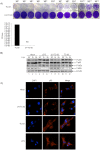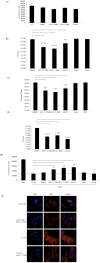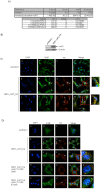The role of IKKβ in Venezuelan equine encephalitis virus infection
- PMID: 24586253
- PMCID: PMC3929299
- DOI: 10.1371/journal.pone.0086745
The role of IKKβ in Venezuelan equine encephalitis virus infection
Abstract
Venezuelan equine encephalitis virus (VEEV) belongs to the genus Alphavirus, family Togaviridae. VEEV infection is characterized by extensive inflammation and studies from other laboratories implicated an involvement of the NF-κB cascade in the in vivo pathology. Initial studies indicated that at early time points of VEEV infection, the NF-κB complex was activated in cells infected with the TC-83 strain of VEEV. One upstream kinase that contributes to the phosphorylation of p65 is the IKKβ component of the IKK complex. Our previous studies with Rift valley fever virus, which exhibited early activation of the NF-κB cascade in infected cells, had indicated that the IKKβ component underwent macromolecular reorganization to form a novel low molecular weight form unique to infected cells. This prompted us to investigate if the IKK complex undergoes a comparable macromolecular reorganization in VEEV infection. Size-fractionated VEEV infected cell extracts indicated a macromolecular reorganization of IKKβ in VEEV infected cells that resulted in formation of lower molecular weight complexes. Well-documented inhibitors of IKKβ function, BAY-11-7082, BAY-11-7085 and IKK2 compound IV, were employed to determine whether IKKβ function was required for the production of infectious progeny virus. A decrease in infectious viral particles and viral RNA copies was observed with inhibitor treatment in the attenuated and virulent strains of VEEV infection. In order to further validate the requirement of IKKβ for VEEV replication, we over-expressed IKKβ in cells and observed an increase in viral titers. In contrast, studies carried out using IKKβ(-/-) cells demonstrated a decrease in VEEV replication. In vivo studies demonstrated that inhibitor treatment of TC-83 infected mice increased their survival. Finally, proteomics studies have revealed that IKKβ may interact with the viral protein nsP3. In conclusion, our studies have revealed that the host IKKβ protein may be critically involved in VEEV replication.
Conflict of interest statement
Figures










References
-
- Steele KE, Twenhafel NA (2010) REVIEW PAPER: pathology of animal models of alphavirus encephalitis. Vet Pathol 47: 790–805. - PubMed
Publication types
MeSH terms
Substances
LinkOut - more resources
Full Text Sources
Other Literature Sources
Molecular Biology Databases

